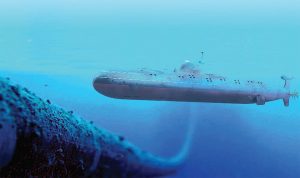 We must do more to protect the indispensable yet insecure internet infrastructure provided by undersea cables, urges Rishi Sunak MP in Undersea Cables: Indispensable, Insecure published by Policy Exchange today.
We must do more to protect the indispensable yet insecure internet infrastructure provided by undersea cables, urges Rishi Sunak MP in Undersea Cables: Indispensable, Insecure published by Policy Exchange today.
97% of global communications and $10 trillion in daily financial transactions are transmitted, not by satellites in the skies, but by cables lying deep beneath the ocean. Undersea cables are the indispensable infrastructure of our time, essential to our modern life and digital economy, yet they are inadequately protected and highly vulnerable to attack at sea and on land, from both hostile states and terrorists.
US intelligence officials have spoken of Russian submarines “aggressively operating” near Atlantic cables as part of its broader interest in unconventional methods of warfare. When Russia annexed Crimea, one of its first moves was to sever the main cable connection to the outside world.
Undersea cables come ashore in just a few remote, coastal locations. These landing sites are critical national infrastructure but often have minimal protection, making them vulnerable to terrorism. A foiled Al-Qaeda plot to destroy a key London internet exchange in 2007 illustrates the credibility of the threat.
Since the first trans-Atlantic cable laid in 1858, cables have mainly been installed and owned by private companies. Although positive for taxpayers, this has meant undersea cables do not get the attention from governments they deserve.
The report recommends that:
- The next Strategic Defence and Security Review should specifically address threats to Britain’s security from attacks on our undersea cable infrastructure
- The Centre for the Protection of National Infrastructure should quickly review and improve security at UK landing sites where cables come ashore
- Britain and NATO must ensure their maritime resources are adequate to deal with this new threat to our security
- The government should work with private communications companies to install more backup ‘dark cables’ and improve monitoring at sea
- We should follow the example of Australia and New Zealand and establish Cable Protection Zones around our highest value communications corridors
- The UK must lead efforts to develop a new international treaty to protect undersea cables
This report has been endorsed by Admiral James Stavridis, US Navy (Ret), former NATO Supreme Allied Commander; Robert Hannigan, former Security Adviser to the Prime Minister and Director of GCHQ until earlier this year; and General Lord Houghton, former UK Chief of Defence Staff, who stepped down in 2016.
In his Foreword to the report, Admiral Stavridis says
“It is not satellites in the sky, but pipes on the ocean floor that form the backbone or the world’s economy. We have allowed this vital infrastructure to grow increasingly vulnerable and this should worry us all.
“Over my own career, I have seen the Atlantic transition from being a theater characterized by near complete NATO supremacy to a space that Russia is actively contesting through a resurgent naval doctrine. If the relative weakness of the Russian position makes a conventional conflict with NATO unlikely, it also raises the appeal for them of asymmetric targets like fibre optic cables. We should prepare for increased maritime hybrid activity, not just from Russia, but also from China and Iran.”
Rishi Sunak MP, the author of the report, says:
“A successful attack on the UK’s undersea cable infrastructure would be an existential threat to our security. Yet the exact locations of these cables are both isolated and publicly available – jugulars of the world economy which are a singularly attractive target for our enemies.
“Since the first transatlantic cable was laid in 1858, undersea cables have generally been owned and installed by private companies. Although this is good for taxpayers, it also means that most governments have not given undersea cables enough attention.
“As we debate our future defence priorities, protecting the freedom of the seas and all the lanes of communication on and under them is paramount. Britain and our NATO allies must ensure that our maritime capabilities get the investment they need.”

